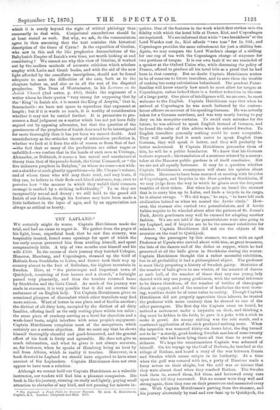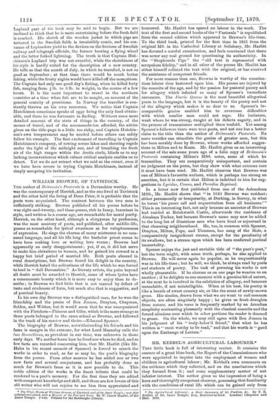TRY LAPLA.ND.* WE certainly might do worse. Captain Hutchinson made
the trial, and had no cause to regret it. We gather from the pages of his light, loose, superficial book that he saw fine scenery, was hospitably treated, found some openings for sport of which the too early season prevented him from availing himself, and spent comparatively little. A trip of two months cost himself and his wife £100. In the course of their journey they touched Cologne, Hanover, Hamburg, and Copenhagen, steamed up the Gulf of Bothnia from Stockholm to Lulea, and thence took their way up country almost to the foot of Sulitelma, the highest mountain in Sweden. Here, at " the picturesque and important town of Quickjock, consisting of four houses and a church," a fortnight passed very pleasantly, and then the tourists returned home by Stockholm and the Gota Canal. As much of the journey was made in steamers, it is very possible that it did not overtax the endurance of an English lady. Yet Captain Hutchinson gives us occasional glimpses of discomfort which other travellers may find more serious. Want of horses in one place and of food in another ; the dirtiest of all dirty huts, occupied by the dirtiest of all dirty families, offering itself as the only resting-place within ten miles ; the same piece of crockery serving as a bowl for chocolate and a wash-hand basin, might interfere with some people's enjoyment. Captain Hutchinson complains most of the mosquitoes, which certainly are a serious objection. But we must say that he shows himself thoroughly cheerful and good-humoured, and the general effect of his book is lively and agreeable. He does not give us much information, and what he gives is not always accurate, -as, for instance, when he speaks of Hamburg being an hour by rail from Altona, which in reality it touches. Moreover, in a book devoted to Lapland we should have expected to have some account of the Laplanders. Captain Hutchinson does not even appear to have seen a reindeer.
Although we cannot hold out Captain Hutchinson as a valuable instructor, our readers will find him a pleasant companion. His book is like his journey, running on easily and lightly, paying small attention to obstacles of any kind, and not pausing for minute in-
• 75s, Lapland: a Fresh Field for Summer Tourists. By Alex. H. Hutchinson, Captain, B.A. London : Chapman and Hall. 1870.
quiries. One of the features in the work which first strikes us is the fidelity with which the hotel bills at Dover, Kiel, and Copenhagen are reprinted. We are informed that while " two breakfasts" at the Lord Warden cost 5s., Kiel affords "two teas" for ls. 10d., and Copenhagen provides the same refreshment for just a shilling less. Again, we may compare the Lord Warden's charge of a shilling for one cup of tea with the Copenhagen charge of sixpence for two portions of tongue. It is our own fault if we are reminded of a speaker at the Oxford Union who, while discussing the policy of France, offered to produce all his hotel bills as a proof that he had been in that country. But no doubt Captain Hutchinson wishes to be of some use to future travellers, and to save them the trouble of making too many calculations beforehand. The prudent Pater- familias will know exactly how much he must allow for tongue at Copenhagen, unless indeed there is a further reduction iu the case of a large party. One piece of intelligence will, we are sure, be most welcome to the English. Captain Hutchinson says that when he arrived at Copenhagen he was much bothered by the custom- house officers on account of his speaking German. He was actually taken for a German merchant, and was very nearly having to pay duty on his mosquito-curtains. To avoid such mistakes for the future, he was advised to speak English instead of German, and he found the value of this advice when he entered Sweden. To English travellers generally nothing could be more acceptable. They will mostly find it much easier to speak English than German, they will speak it better, and they will probably be better understood. If Captain Hutchinson persuades them of this, he will be a public benefactor. We know that his German is above reproach ; his translation of a sentence uttered by a money- taker at the Hanover public gardens is of itself conclusive. But we are not all equally fortunate. It may be a question whether Captain Hutchinson's countrymen will share his opinion about bicycles. He seems to have been annoyed at meeting with bicycles at Copenhagen, and bicycles in the Deer-garden at Stockholm, if we may judge from the way in which he gloats over the frequent tumbles of their riders. But when he gets on board the steamer that is to carry him up to Lulea, and finds a bicycle in its cargo, he is almost savage. " We did hope," he says, " to have left such civilization behind us when we neared the Arctic circle." How- ever, the steamer also carried two perambulators, and if Arctic babies require to be wheeled about after the pattern of Sc. James's Park, Arctic gentlemen may well be excused for adopting another fashion. We are not told if the perambulators were also going to try Lapland, and if bicycles are to be the summer substitutes for reindeer. Captain Hutchinson did not see the objects of his aversion on the road to Quickjock.
Among the passengers by this steamer, we meet with an aged Professor at Upsala who carried about with him, as great treasures, the lists of the dances and of the dishes at supper, which he had preserved at all the balls given in Stockholm during the winter. Captain Hutchinson thought this a rather mournful exhibition, but in all probability it had a philosophical object. The professor is most likely preparing a history of Swedish gaiety. Statistics of the number of balls given in one winter, of the number of dances at each ball, of the number of times that any one young lady deuced with any one young gentleman, with the natural inference to be drawn therefrom, of the number of bottles of champagne drunk at supper, and of the number of headaches the next morn- ing, would no doubt be of some value to society. Though Captain Hutchinson did not properly appreciate these labours, he treated the professor with more courtesy than he showed to one of the other passengers. The first day the Captain came on board, he noticed a movement under a tarpaulin on deck, and thinking a dog must be hidden in the folds, he gave it a poke with a stick to make it growl. An uneasy shifting was the sole result, and a continued application of the stick produced nothing more. IThen the tarpaulin was removed thirty-six hours later, the dog turned out to be " a sturdy, good-looking Swedish maiden of some twenty summers," who had been lying there all that time to avoid sea- sickness. We hope the unceremonious Captain was ashamed of himself. On his voyage up the Gulf of Bothnia, he touched at the village of Lathan, and heard a story of the war between Russia and Sweden which seems unique in its barbarity. At a time when the gulf was covered with ice, a party of Russians made a foray across on their sleighs, but the cold was so intense that they were almost dead when they reached Rathan. The Swedes took them in, nursed them, fed them, and bestowed every care upon them till they recovered. But no sooner were they well and strong again, than they rose on their preservers and massacred every one. With Captain H.utchinson's parting from the steamer, and his journey alternately by road and row-boat up to Quickjock, the
Lapland part of his book may be said to begin. But we are inclined to think that he is more entertaining before the fresh field is reached. His sketch of the wooden jacket in which pigs are tethered in the Swedish fields is irresistibly comic, and his cos- tumes of Laplanders yield to the devices on the buttons of Swedish railway and telegraph officials, the former bearing a flying wheel and the latter forked lightning. The truth is that Captain Hut- chinson's Lapland trip was not eventful, while the sketchiness of his style is hardly suited for the description of a new country. He tells us that the month of July, in which he travelled, is not so good as September ; at that time there would be much better fishing, while the frosty nights would have killed off the mosquitoes. The Captain had only one good day's fishing, when he killed forty fish, ranging from lb. to 3 lb. in weight, in the course of a few hours. It is the more important to travel in the northern countries at a time when fish are to be caught, on account of the general scarcity of provisions. In Norway the traveller is con- stantly thrown on his own resources. We notice that Captain Hutchinson sometimes speaks of eggs being the only food obtain- able, and these he was fortunate in finding. Without some more detailed account of the state of things in the country, of the means of travel, and of the accommodation afforded, the advice given on the title-page is a little too risky, and Captain Hutchin- son's own temperament may be needed before others can safely follow his example. The first excitement of travelling in Captain Hutchinson's company, of rowing across lakes and shooting rapids under the light of the midnight sun, and of breathing the fresh air of the high ranges within the Arctic circle, blinds us to any lurking inconveniences which calmer critical analysis enables us to detect. Yet we do not retract what we said at the outset, even if we have been severe in trying Captain Hutchinson, instead of simply accepting his invitation.































 Previous page
Previous page